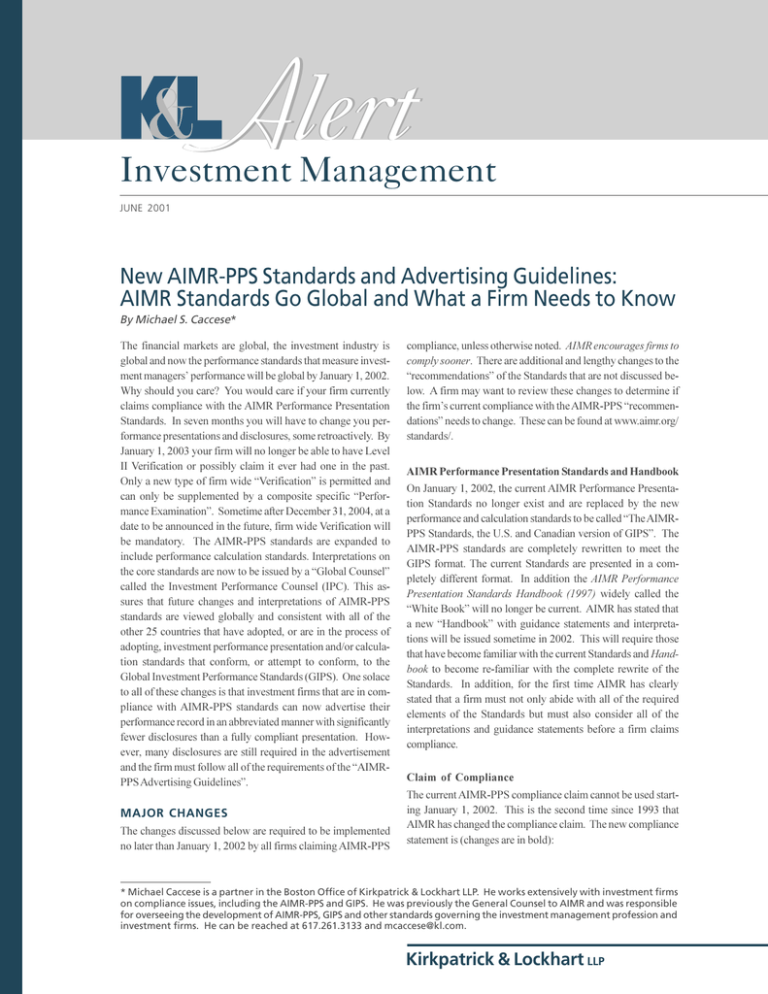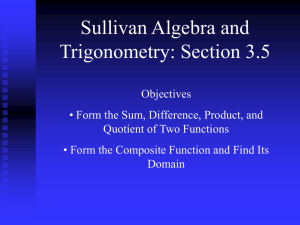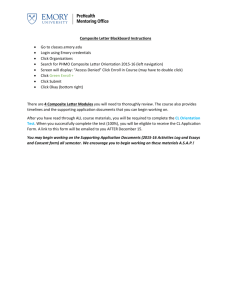
A lert
Investment Management
JUNE 2001
New AIMR-PPS Standards and Advertising Guidelines:
AIMR Standards Go Global and What a Firm Needs to Know
By Michael S. Caccese*
The financial markets are global, the investment industry is
global and now the performance standards that measure investment managers performance will be global by January 1, 2002.
Why should you care? You would care if your firm currently
claims compliance with the AIMR Performance Presentation
Standards. In seven months you will have to change you performance presentations and disclosures, some retroactively. By
January 1, 2003 your firm will no longer be able to have Level
II Verification or possibly claim it ever had one in the past.
Only a new type of firm wide Verification is permitted and
can only be supplemented by a composite specific Performance Examination. Sometime after December 31, 2004, at a
date to be announced in the future, firm wide Verification will
be mandatory. The AIMR-PPS standards are expanded to
include performance calculation standards. Interpretations on
the core standards are now to be issued by a Global Counsel
called the Investment Performance Counsel (IPC). This assures that future changes and interpretations of AIMR-PPS
standards are viewed globally and consistent with all of the
other 25 countries that have adopted, or are in the process of
adopting, investment performance presentation and/or calculation standards that conform, or attempt to conform, to the
Global Investment Performance Standards (GIPS). One solace
to all of these changes is that investment firms that are in compliance with AIMR-PPS standards can now advertise their
performance record in an abbreviated manner with significantly
fewer disclosures than a fully compliant presentation. However, many disclosures are still required in the advertisement
and the firm must follow all of the requirements of the AIMRPPS Advertising Guidelines.
MAJOR CHANGES
The changes discussed below are required to be implemented
no later than January 1, 2002 by all firms claiming AIMR-PPS
compliance, unless otherwise noted. AIMR encourages firms to
comply sooner. There are additional and lengthy changes to the
recommendations of the Standards that are not discussed below. A firm may want to review these changes to determine if
the firms current compliance with the AIMR-PPS recommendations needs to change. These can be found at www.aimr.org/
standards/.
AIMR Performance Presentation Standards and Handbook
On January 1, 2002, the current AIMR Performance Presentation Standards no longer exist and are replaced by the new
performance and calculation standards to be called The AIMRPPS Standards, the U.S. and Canadian version of GIPS. The
AIMR-PPS standards are completely rewritten to meet the
GIPS format. The current Standards are presented in a completely different format. In addition the AIMR Performance
Presentation Standards Handbook (1997) widely called the
White Book will no longer be current. AIMR has stated that
a new Handbook with guidance statements and interpretations will be issued sometime in 2002. This will require those
that have become familiar with the current Standards and Handbook to become re-familiar with the complete rewrite of the
Standards. In addition, for the first time AIMR has clearly
stated that a firm must not only abide with all of the required
elements of the Standards but must also consider all of the
interpretations and guidance statements before a firm claims
compliance.
Claim of Compliance
The current AIMR-PPS compliance claim cannot be used starting January 1, 2002. This is the second time since 1993 that
AIMR has changed the compliance claim. The new compliance
statement is (changes are in bold):
* Michael Caccese is a partner in the Boston Office of Kirkpatrick & Lockhart LLP. He works extensively with investment firms
on compliance issues, including the AIMR-PPS and GIPS. He was previously the General Counsel to AIMR and was responsible
for overseeing the development of AIMR-PPS, GIPS and other standards governing the investment management profession and
investment firms. He can be reached at 617.261.3133 and mcaccese@kl.com.
Kirkpatrick & Lockhart LLP
[Insert name of firm] has prepared and presented this
report in compliance with the Performance Presentation
Standards of the Association for Investment Management
and Research (AIMR-PPS), the U.S. and Canadian version of the Global Investment Performance
Standards (GIPS). AIMR has not been involved in the
preparation or review of this report.
Leverage
n
n
Firm Definition
A global firm can no longer after December 31, 2004 define itself
as all assets managed to one or more base currencies. This
should affect only a small number of firms. However, it will
cause these investment firms to completely redefine themselves
and create new composites that fit the new firm definition.
Since a firm defined as a base currency will no longer exist
starting 2005, the performance records that were created under
this old definition will have to be recreated back to 1993 under
the newly defined firm.
Composite Creation and Maintenance
The revised Standards clarify that:
n
n
firms may follow specific client mandates when including
new portfolios in composites, and
it is permissible to switch portfolios from one composite to
another when a composite is redefined.
Carve-outs will no longer be permitted after December 31, 2000.
The current Standards permit a firm to carve out an asset class
from a balanced portfolio so long as cash is allocated to the
carve-out. Determining the cash allocation and monitoring it is
difficult and limited by system constraints. Under the revised
Standards, all multiple asset class portfolios can not be broken
up to create carve-outs unless the particular asset class was
managed separately with its own cash allocation.
Weighting Returns and Composites
n
After December 31, 2004, time-weighted rates of return
must adjust for daily weighted cash flows, and accrual accounting is required for dividends as of the ex-dividend date.
n
2
The revised Standards clarify that no particular method is
required for asset weighting composites so long as it uses
beginning-of-period weightings or a method that reflects both
beginning market values and cash flows.
Firms that use leverage or derivatives are required to disclose
such usage and the effect on performance.
Portability
n
The revised Standards clarify that the performance results
of a past firm or affiliation can only be linked to or used to
represent a historical record of a new firm or affiliation if:
a change only in firm ownership or name occurs, or
substantially all of the assets included in the
composite transfer to the new firm, and the investmentdecision making process remains substantially unchanged
and the new firm has performance records to substantiate the performance.
Required Disclosures
The revised Standards have made changes in disclosures to be
consistent with GIPS. Most of the changes are changing the
currently required disclosures to recommended disclosures.
The three required disclosure changes are:
n
n
Calculation Standards
The AIMR-PPS standards are drafted as presentation standards, not calculation standards, even though there were certain
recommended calculation methods presented in the White
Book, but they were not part of the Standards. GIPS, which is
the Standard that AIMR-PPS has been revised to model, are
clearly both presentation and calculation standards. Accordingly, the revised AIMR-PPS standards require firms to use the
calculation standards set forth in the revised Standards. They
are substantially similar to the current calculation methodologies described in the current AIMR-PPS standards.
Restating of performance to an all cash basis when leverage is used is eliminated, with AIMR committing the IPC to
clarify the calculation methodologies to use for calculating
and presenting performance when leverage and derivatives
are used in a portfolio.
n
effective January 1, 2002 and to be done retroactively from
January 1, 1997, a firm must provide the number of portfolios and amount of assets in each composite and the
percentage of firms total assets represented by the composite at the end of each period; AIMR-PPS previously
permitted firms to select either the beginning or end of the
period to determine this information,
a firm is no longer required, but it is recommended, to disclose the average weighted management fee when performance
is reported only net of fees; firms are still required to disclose their fee schedule, and
a firm is no longer required to disclose any material change in
personnel responsible for investment management for the
period reported, but is now a recommendation and expanded to include, in addition to personnel changes, any
other significant events within the firm.
International
All of the special requirements in the AIMR-PPS standards are
eliminated and now under the revised Standards international
portfolios are treated the same as domestic portfolios for purposes of calculation, presentation and disclosures.
Wrap-Fee Accounts
The revised Standards require:
n
usage of the highest applicable wrap-fee of all wrap-fee
accounts included in a composite to determine the net-offees performance of any non wrap-fee account in the
composite, and
KIRKPATRICK & LOCKHART LLP INVESTMENT MANAGEMENT ALERT
n
reporting gross-of-fees wrap account composite performance only as supplemental performance.
Verification
Starting January 1, 2002, in order for a firm to claim Level II
Verification of one or more composite performance the firm
must have a completed firm-wide Level I Verification as described in the revised AIMR-PPS standards. In addition Level
II is renamed Performance Examination (Level II). The revised Standards include a new appendix that describes in detail
the procedures required to conduct a Verification and Performance Examination.
Starting January 1, 2003, Level I and II Verifications are eliminated. In their place are only Verification and a Performance
Examination reports. Performance Examination (Level II)
name is changed again to delete the (Level II) phrase.
Revised AIMR-PPS Verification requires that an independent
third party verify that the firm has:
n
n
complied with all of the composite creation requirements of
the Standards on a firm-wide basis, and
processes and procedures designed to calculate and present
performance results in compliance with the revised AIMRPPS standards.
Only after a firm wide Verification occurs can a firm then have a
composite specific Performance Examination. To prevent an
investment firm that claims AIMR-PPS compliance from having a traditional performance audit of the firms reported
performance, the revised AIMR-PPS standards prohibit the
firm from making any reference to a client or potential client
that a Performance Examination or audit was done on the
performance numbers presented unless:
n
n
a firm-wide Verification was completed as part of the
Performance Examination, and
placed in a public advertisement. The Advertising Guidelines
enable a firm to present a shorter presentation so long as the
recipient of the information is informed of where a fully compliant performance report can be obtained and the information is
sent within seven days of the request or included on the internet.
Applicability
Advertisement Material
The Guidelines define Advertisement as any written
material (other than one-on-one presentations) distributed
to maintain existing clients or solicit new clients for an advisor. It does not include performance or claims of AIMR-PPS
compliance delivered in on-on-one presentations.
Types of Claims
The Advertisement Guidelines are applicable to any advertisement that either included performance numbers or a claim of
AIMR-PPS compliance without any performance numbers.
Permissible Recipients
n
n
n
the verifiers report states that the examination was completed in accordance with the requirements of the AIMR-PPS
standards.
ADVERTISING
GUIDELINES
The AIMR-PPS Advertising Guidelines are a significant step
forward to assist a compliant investment firm to develop
business.
Purpose
The purpose of the Advertising Guidelines is to permit investment firms that claim compliance with the AIMR-PPS standards
to present their performance or make a statement that the firm
complies with the AIMR-PPS standards to more than one person. Under the current Standards, whenever a firm claims
AIMR-PPS compliance or presents investment performance,
the firm must include a compliant performance presentation
including ten years or life of composite performance along with
all of the required disclosures. Such information rarely could be
JUNE 2001
n
ONE-ON ONE PRESENTATIONS - There is no definition of a
one-on-one presentation. The only clarification is that
performance or a claim of compliance delivered to a person that the manager knows is a one-on-one presentation
and therefore requires the delivery of a fully compliant
presentation.
REQUEST FOR PROPOSALS Responses to consultant questionnaires are not advertisements and are considered
one-on-one presentations. However, a firm can send performance numbers without referring to them as
supplemental information so long as a compliant presentation is included with the RFP response.
“FLASH” REPORTS Flash reports are abbreviated presentations of composite performance for interim periods shorter
than twelve months. Flash reports are not considered advertising material and can be used so long as the recipient
received a fully compliant presentation within the past twelve
months and the report includes a statement that a full AIMR
compliant presentation is available upon request.
INTERNET PRESENTATIONS All performance included on the
internet by an investment firm must include a link to a fully
compliant performance presentation. If the internet site
only includes a statement of AIMR-PPS compliance without any performance numbers, the firm can either supply a
link to a fully compliant presentation report or list a contact
person where a fully compliant presentation report can be
obtained. The compliant report must be delivered within
seven days of receipt of the request.
Required Advertisement Legend
All investment firm advertisements that report performance or
a claim of compliance must include the following legend:
[Insert name of firm] claims compliance with the AIMR
Performance Presentation Standards (AIMR-PPS), the U.S.
Kirkpatrick & Lockhart LLP
and Canadians version of GIPS. AIMR has not been involved with or reviewed [insert name of firm]s claim of
compliance. To receive a complete list and description of
[insert name of firm]s composites and/or presentation
that adheres to the AIMR-PPS standards, contact [insert
contact name, contact information, and /or internet/email address].
the performance record is not in compliance and the period
of non-compliance, and
disclose, if applicable, the performance is Level 1 verified
and the period verified:
n
firms are prohibited from disclosing in any advertisement
that the composite is Level II verified or undergone a
Performance Examination or performance audit
Delivery Requirement
Investment firms must provide a fully compliant AIMR-PPS
presentation or a complete list of all firm composites within
seven business days of any request. Posting this information
on the firms Web site and informing the client of the address
satisfies this seven days delivery requirement.
Supplemental Information
Investment firms may include supplemental information in
advertisements provided that the information:
is labeled as supplemental,
n
shown with equal or lesser prominence than the required
disclosures:
n
Required Disclosures
gross-of-fees performance when shown must be presented with equal prominence to the net-of-fees
performance in a format to facilitate ease of comparison,
All Advertisements must include the following
disclosures:
n
firm definition, and
n
required Advertisement Legend.
supplemental performance information can only be included
with an advertisement that includes all of the required disclosures for a performance advertisement.
n
Advertisements that include performance must include the following additional disclosures:
n
n
n
CONCLUSION
composite/strategy description,
if non-fee paying portfolios are included in the composite,
disclose this fact and the percentage of non-fee paying portfolios represented in the composite for the most recent period
performance is displayed,
if leverage and derivatives are used in any portfolio included
in the composite, disclose this fact and the extent of usage,
n
currency used to report performance,
n
dollar amount of assets represented by the composite,
n
n
n
n
percentage of firms total assets that the composite represents as of the end of the period for the most recent period
performance is displayed,
annualized total returns net-of-fees taken from a fully AIMRPPS compliant presentation for one, five, and ten-year
periods or life of the performance record if less than ten
years, reported through the end of the most recent calendar
quarter end,
The AIMR Performance Presentation Standards are the only
industry standards for presenting investment performance. The
changes in the revised Standards will require firms to further
update their systems and compliance procedures if they claim
AIMR-PPS compliance. While AIMR has used its professional conduct program against its members to enforce
compliance, such enforcement has been few and far between.
The real concern is the SEC enforcing compliance with the
AIMR-PPS standards by firms that claim compliance. The
revised Standards and the Advertising Guidelines necessitates
firms that claim AIMR-PPS compliance to ensure that their
performance presentations and calculations are in full compliance with the revised Standards.
end-of-period date for each period,
if the ten year performance includes performance prior to
the applicable AIMR-PPS compliance dates that is not in
compliance with the AIMR-PPS standards, disclose that
If you would like to discuss any of these issues, please contact the author
or any of the following K&L Investment Management lawyers:
Boston
Michael S. Caccese
Philip J. Fina
Los Angeles William P. Wade
New York
Richard D. Marshall
San Francisco Richard A. Phillips
Washington Arthur J. Brown
617.261.3133
617.261.3156
310.552-5071
212.536.3941
415.249.1010
202.778.9046
mcaccese@kl.com
pfina@kl.com
wwade@kl.com
rmarshall@kl.com
rphillips@kl.com
abrown@kl.com
Kirkpatrick & Lockhart LLP
Challenge us.
BOSTON
n
DALLAS
n
HARRISBURG
n
LOS ANGELES
n
MIAMI
n
NEWARK
n
NEW YORK
n
PITTSBURGH
n
SAN FRANCISCO
n
WASHINGTON
.........................................................................................................................................................
This publication/newsletter is for informational purposes and does not contain or convey legal advice. The information herein
should not be used or relied upon in regard to any particular facts or circumstances without first consulting with a lawyer.
4
© 2001 KIRKPATRICK & LOCKHART LLP.
ALL RIGHTS RESERVED.




